NEVILLE DUNNE – PANEGYRIC - a tribute and our opportunity to learn the life and ministry of our confrere
Unless the grain of wheat falls on the ground and dies, it remains only a single grain; but if it dies, it yields a rich harvest. (Jn. 14. 5 – 6)
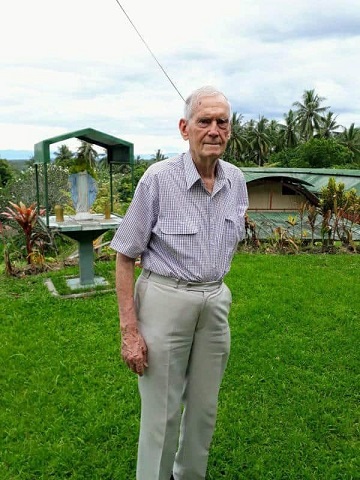
In Milne Bay we sometimes translate this image as: if the coconut does not let go and fall to the ground, it will only ever be a coconut. But if it lets go and falls to the ground and dies, it becomes a coconut tree and produces thousands of coconuts.
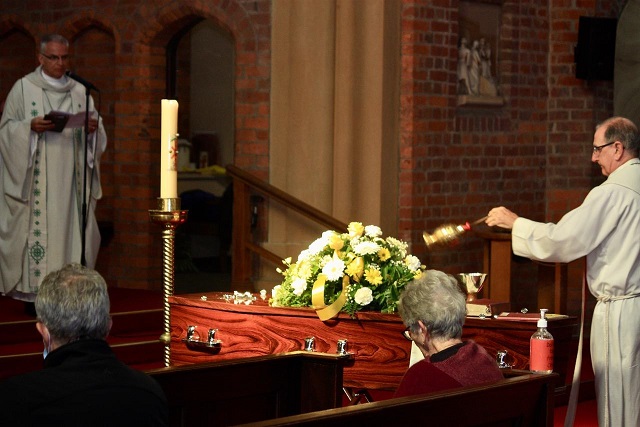
_____________________
When Neville was appointed area superior of Milne Bay in 1980, the Provincial, Fr Dennis Murphy, sent him a short letter of congratulations and offer of support. In reply, Neville wrote a long letter in which he praised Dennis for a eulogy he had delivered recently, for Bert Cuneo, for his ability to see beneath the surface to the goodness of people. Neville commented that, if Dennis were to preach his eulogy, he would have to work hard and search deeper to discover the goodness.
This morning it is my privilege to try and explore the goodness of his life, to speak of his moments of dying and the abundant harvest his ministry produced.
Neville came to us from Downlands College, one of six students who went to Douglas park in 1951, it is said as a result of a retreat preached by Fr Frank Quirk. Neville had been school captain during his final year and had been a member of the first fifteen rugby team for four years. He was fly – half. Those who know rugby tell us that a good fly-half needs two qualities: an ability to read the play and to adapt quickly.
In the documents for vows and orders there is one heading that reads: piety/religious spirit/ discipline/ zealousness. In the application for deaconate, Jim Cuskelly wrote of Neville: Exemplary in all these things. One of the men who was a few years junior to Neville at Croydon told me: He did not talk much, but if Brother Dunne spoke, we all listened and followed his advice.
After his ordination in 1959, Neville was appointed to the MSC mission in Eastern Papua, to Sideia Island, as a teacher and pastor. At that time there was a girl’s school and a boy’s school at Sideia to primary level, but they were being combined into one high school under the leadership of Fr John McGhee. Neville taught himself to teach science, because no one else was willing to do so. In 1965, Neville took over as headmaster of the new Sacred Heart High School and began to make plan to move the school to the mainland at Hagita, where there was space for expansion. In 1969 they moved from the order and stability of Sideia to the rain, mud, flooded rivers and disorder of Hagita.
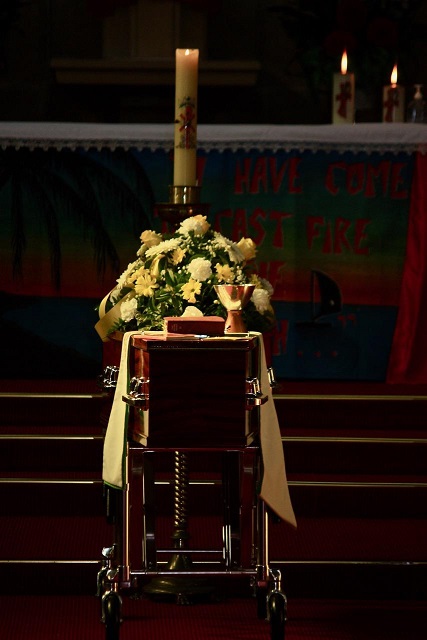
Being the founding Father of Sacred Heart High School, Hagita, was both part of Neville’s harvest and of his dying. Most missionaries cope easily with the personal poverties of their situation (poor accommodation, leaking roofs, boring diet, limited recreational facilities), but the experience of real poverty of resources to build and develop can be either deeply dispiriting and disheartening or it can deepen the heart and spirit. It seems to depend on two movements of heart: letting go of ego (it is not my work, it is God’s work, and will happen in His good time); and gratitude for whatever resources one is given. Neville grew in patience, in acceptance of reality and in gratitude for the resources he was given. With Graham Furness he taught himself to become a draughtsman and quantity surveyor. He begged architects and borrowed a bulldozer and grader as needed. With our MSC brothers, with Graham and with Ray and Hank Flapper, the school was built slowly each year.
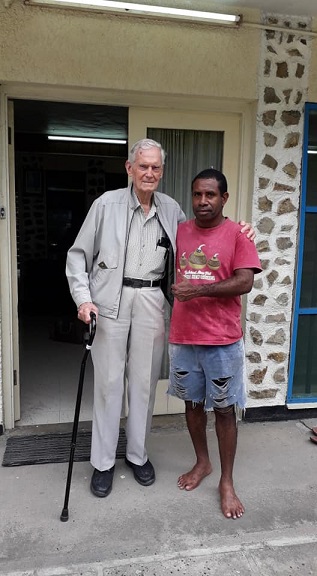
At the same time Neville was leading staff to set the intellectual and spiritual foundations of the new school. He often spoke about the need for a well-rounded education (what later came to be called integral human development). In this, he was supported by his senior staff, especially the OLSH Sisters, Margaret Jennings, Evelyn Page, Helen Warman, Maria Koae, Zita Pushai nd others. These Sisters, together with Michael Morwood, Mick Puls, Col Milne and myself were the core staff for several years.
Neville never drank alcohol, but he did keep a bottle of whiskey in his house. This was for John Guise (later Sir John Guise, the first Governor General of Papua New Guinea. John was the local member of the Legislative Council / House of Assembly; whenever he returned from meetings in Port Moresby he would walk or catch a ride from the airstrip, look for Neville and ask for “a cup of tea” and they would tell stories for hours. John Guise adopted the school and helped obtain government grants for building and administrative costs.
His students of those years (Danny Luke and Carrie are here today) remember Neville as always kind and compassionate, friendly and firm, gentle and humble. That is a beautiful harvest.
The 1970’s were a time of rapid change for both the country and the Church. The country in its journey to independence and the Church changing from a mission to a local Church. We had three years of meetings and workshops leading up to the general assembly of the church in 1975, with the theme: We are Church, Alive in Christ. The goal was to help people understand that the church was no longer a foreign mission, or just the priests and religious, but a local church involving all.
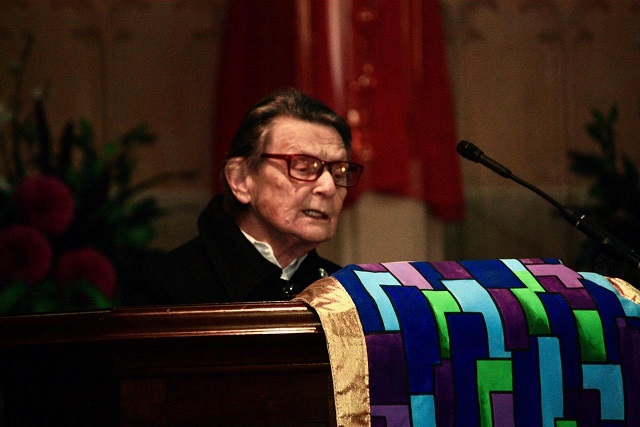
Bishop Moore had been sending an MSC priest and an OLSH Sister to the East Asian Pastoral Institute in Manila for the past few years, to help prepare his co-workers to form people in this new way of being church and to learn about Vatican 2. In 1974 /75 Neville and Helen Warman were sent. Neville wrote about this year as a wonderful experience, the first time he had the opportunity to read more widely and reflect and share since his seminary days. There was some discussion that he might stay on at EAPI and pursue a Masters in Ministry or Spirituality, but this did not happen. Neville accepted this with good grace and returned to PNG.
He was appointed Paris Priest of Budoya on Ferguson Island, with a plan that he would gain parish ministry experience and then work in the new Pastoral Training Centre that Bishop Moore was establishing to train more lay leaders for the emerging church.
In 1980, Neville was appointed Area superior of the MSC in Milne Bay. His main challenge as superior was not with the Australian MSC, most of whom were independent workers and fairly set in their ways. His challenge was how to integrate Papua New Guinea MSC into such an established order so they would feel welcomed and be productive. It was as Area superior that Neville attended the second Chapter of the PNG Pro-Province in 1986. He was shocked to find himself one of those nominated for Provincial and, after the second ballot, elected. He wanted to refuse his election but Kees Braun, the Superior General who was present at the Chapter told him: Please, Nev, accept it. They need you now; they just voted for you; you are now a member of this new Province.
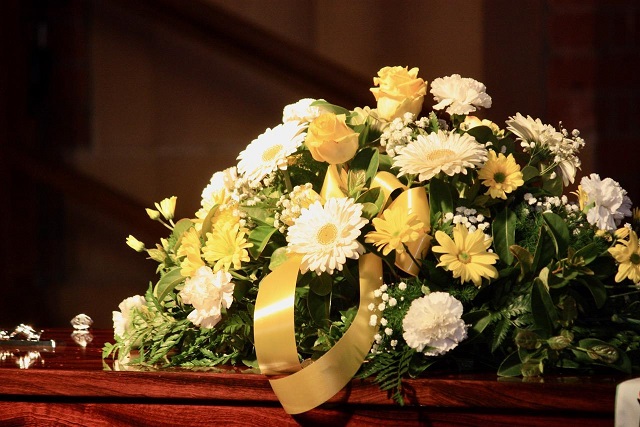
The challenge he faced as Provincial were on a much bigger scale to anything he had previously faced. The challenge of inadequate buildings / office space was solved when the Australian Provincial, Fr Jim Littleton, gifted the buildings at Two Mile to the PNG Province, with the understanding it could also be used as a transit house for other MSC. The challenges of establishing and strengthening processes and structures for finance, formation and governance were gradually resolved. The biggest challenge was negotiating the relationships of the new PNG Province with the groups of MSC from other Provinces - Australia, France, Germany, USA. This was an impossible task – among us Aussies there were at least three different ideas about the relationship. Neville wisely did not try and force any model but allowed things to change and grow slowly.
Neville wrote about his time as Provincial: I tried my best to bring stability and a sense of unity. One measure of his success was that the next three Provincials all asked Nev to be part of their Provincial Council for the institutional memory and wisdom he provided.
When Neville ended his time as Provincial as the end of 1992, he had planned to have a break and then join Frank Dineen at the Chevalier Retreat Centre in Vunapope. This Centre was one of Neville’s initiatives as Provincial. Frank was the founding Director and had been working there for five years. However, Frank was suddenly recalled to Australia at the beginning of 1993, so Neville enjoyed a very short break before beginning his final ministry as a retreat provider and spiritual director in Rabaul. Each year he would lead retreats for several hundred tertiary students at Teachers Colleges and the School of Nursing, usually in groups of about 30 students. He was always available for spiritual direction for many Sisters and other Church personnel in Rabaul. The thousands of people he influenced made him a household name in many parts of PNG.
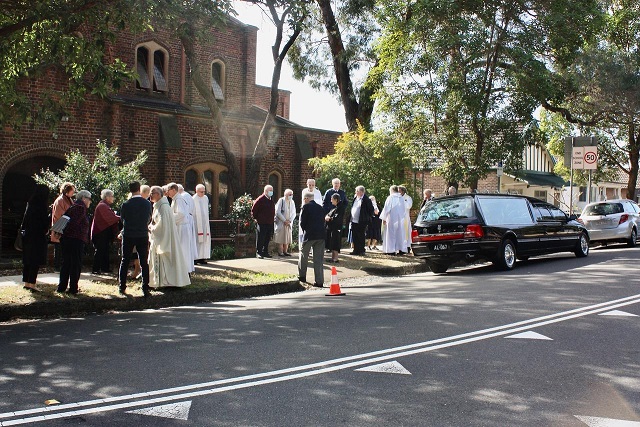
In 2009, I led a retreat for clergy of the Rabaul Archdiocese. We had several sessions of 1 on 1 deep conversations and affirmation. Neville shared with me some of his spiritual journey. He told me how he found freedom in prayer through his chaplaincy of charismatic Catholic groups; he had even experienced talking in tongues, but believed this was to witness his authenticity to the group when he preached St. Paul’s “better way”. He shared his mantra for centering prayer, which was the holy Name of “Jesus”, the name on his lips when he died.
When I marvelled at all the things he had achieved as leader and helper he said he did not do much, only that he wanted to help people appreciate how much God loved them and respond to that love.
The words from the students at St, Mary’s School of Nursing at the back of our booklet this morning witness how much Neville was appreciated by these students and many others: He was so very special to all of us. He really touched our lives with God’s compassion and merciful love. He was a true man of God who lived his MSC vocation. Thank you Fr Neville.
I imagine a sense of great excitement in heaven last Saturday afternoon; excitement from Nev’s parents and brothers, from Bishop Moore and his fellow missionaries, and from the Kalabaku’s and Kaidoga’s, the Nimagore’s and Nogei’s, the Ganisi’s and Dindillo’s and little Martina whom we buried at Hagita many years ago. All excited to meet their friend again and welcome him home.
Paul Jennings MSC
3rd August, 2020
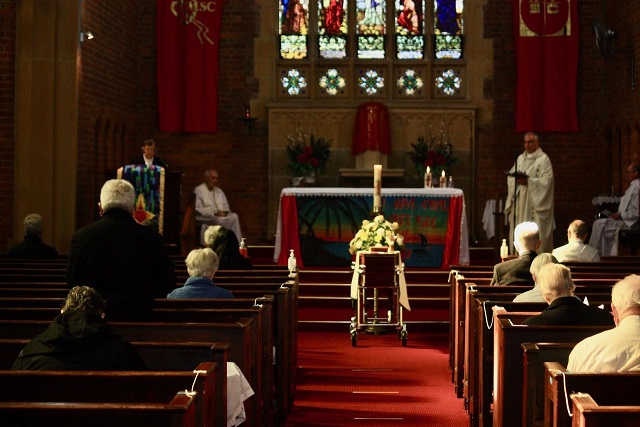
Paul Jennings MSC
August 3rd 2020
Photos: John Walker MSC